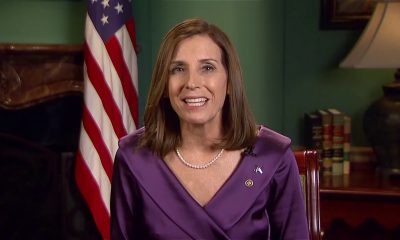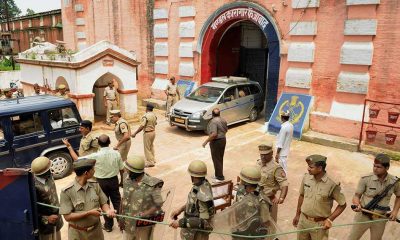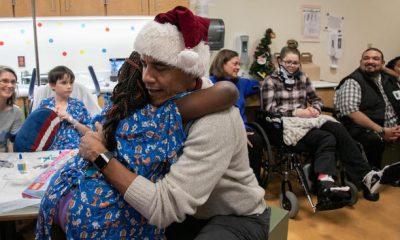World
Citizen historians scrambling to collect 10,000 partition stories

Washington: Back in 1947, Pakistan’s founder Muhammad Ali Jinnah sent noted Indian author Khushwant Singh a message to stay on in Lahore and become a high court judge, an offer he declined and decided to move to Delhi.
“I drove on a totally empty road, blank road, all the way to Delhi. I didn’t see a soul till I reached Delhi,” he told 21 year old Manleen Sandhu before his death in March 2014 relating his personal experience of Partition.
“Jinnah sent a message to me through my father-he was his friend-to stay on in Lahore and become a high court judge. I was a lawyer.”
“Bad times. No humanity at all…After Partition I returned to Lahore many times. I had no venom against anyone,” he said shaking his head as he explained his decision to move amid escalating violence.
Khushwant Singh’s story is among nearly 2000 stories comprising over 4000 hours of video footage recorded by citizen historians like Sandhu for The 1947 Partition Archive.
What began as a small grassroots effort to preserve the disappearing memory of Partition, at the University of California at Berkeley in 2011, has quickly spread across the globe to 157 cities where Partition witnesses reside.
Young, tech savvy citizen historians train to record oral histories and spread out in their communities with their phones or any other recording device as part of what has become the largest known oral history collection of South Asian memories.
Today a majority of the stories come from India, Pakistan and Bangladesh, though many pour in from diasporic communities spread across Europe, North America, the Middle East and Australia.
They’re telling of how far refugees scattered in search of a stable life following Partition.
With those who were teenagers at the time of Partition in their 80’s now, The 1947 Partition Archive has announced a manifesto to record 10,000 stories through 2017, commemorating the 70th anniversary of Partition.
The people-powered Archive relies in part on trained volunteers, or citizen historians, for recording the stories, according to a media release.
To accelerate the recording of stories and reach the 10,000 story goal, the Archive is announcing its next call for story scholars, a ten month long concentrated story collection fellowship programme.
Anyone who has attended a free training to become a citizen historian and recorded a story is eligible to apply. Applications opened on Aug 30 and the deadline to apply is Oct 31.
An anonymous donor, feeling the urgency for recording stories, has endowed the programme with $100,000 which will fund the field work and back-end archiving for 10 story scholars. Together they will record 1800 stories.
As founding donor Dr. Narinder Kapany, an Indian-born American physicist known for his work in fibre optics, says, “Partition affected every community. Stories of Partition are everyone’s stories. And time is of the essence to make them known.”
The Archive will begin releasing the stories for public viewing in 2017.
The Archive’s long term plans include building Centres for Learning on Partition that combine tolerance education, in India, Pakistan and Bangladesh.
The Archive will be launching its task force for institutionalising the memory of partition later in 2015.
The first exhibit based on The Archive’s stories launched in 2014 at the Canadian Museum for Human Rights in Winnipeg.
National
Foodman Vishal Singh Honored for Hunger Free World Mission in Bangkok

Lucknow: Vishal Singh, a renowned social worker from Lucknow, also known as Foodman, has once again made India proud. He was honored by the Happy Hands Gloves Cooperative Limited Company in Korathai, Thailand, for his work with the Hunger Free World Mission.
The Hunger Free World Mission’s meeting was held in Korathai, Thailand, under Vishal Singh’s leadership. Representatives from several countries, including Mr. Raja Dwivedi (Managing Director of Happy Hands Gloves Limited), Thailand Coordinator Mr. Raja Mishra, and member Mr. Varun Singh, attended the event.

Under Vishal Singh’s leadership, the attendees took a pledge to work together toward creating a hunger-free world.
Speaking on the occasion, Vishal Singh explained that the main goal of the Hunger Free World Mission is social participation. He said the mission is not just about feeding people but also about meeting other basic needs of those who are struggling. The mission focuses on helping families of terminally ill patients in hospitals by providing food and shelter. It also works to fulfill essential needs like education, jobs, and care for the elderly.
For the last 16 years, the Vijay Sri Foundation has been providing free services, benefiting thousands of people. Vishal Singh highlighted that the mission aims to gain global recognition like other organizations such as WHO, WWF, and Red Cross, which work for social causes.
During this meeting, Vishal Singh was appointed as the Chairman of the Hunger Free World Mission by representatives from various countries. They also discussed holding regular meetings in different countries to push the mission forward.
Business tycoon Dr. Abhishek Verma has also supported this humanitarian mission, vowing to promote the idea of “Seva Parmo Dharma” (Service is the highest duty) worldwide. Vishal Singh praised him, stating that people like Dr .Abhishek Verma inspire others to work for the betterment of society.
Recently, Romania’s Ambassador, Mr . Daniela Sezonov Ţane, invited Vishal Singh to the Romanian Embassy in Delhi, where they discussed the mission in detail. Impressed by his humanitarian work, she honored Vishal Singh and invited him to Romania to take the mission forward .
Food man Vishal Singh has been serving the people of India for the past 16 years. Through the Vijay Sri Foundation, he provides free meals to cancer patients & their families ,shelter, and education for women & children along with running free old-age homes in Lucknow.
In addition to his humanitarian work, Vishal Singh also addresses issues like crime and corruption through his role as Chairman of Seva Path Media and Managing Director of Vijay Sri Foundation.

During the COVID-19 pandemic, Vishal Singh and his team worked tirelessly to provide food and help to the needy, including starving children, elderly citizens, and pregnant women. Despite contracting the virus himself, he continued to assist others after his recovery. He even created a life-saving oxygen regulator using household items, which was praised by doctors both in India and abroad.
In his address at the meeting, Vishal Singh spoke about his mission to create a hunger-free world. He pointed out that India’s large population, along with issues like unemployment and poverty, has caused the country to fall on the Hunger Index. He urged people to contribute just one handful of grains daily to help create a hunger-free world.
He concluded by saying that through social participation, we can empower the people around us, meet their basic needs, and work together to build a stronger, more prosperous, and developed society.























